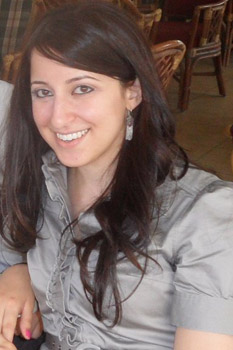 Areej Kuraishi, ’10
Areej Kuraishi, ’10
Psychology
“Adolescent Mother’s Perceptions of the Infant’s Father’s Involvement and Parenting”
Faculty Mentor: Dr. Charissa S. L. Cheah
According to the Guttmach Institute, approximately 750,000 adolescents between the ages of 15 to 19 years become pregnant each year. Research on the relation between interactions of adolescent parents and subsequent caregiving has been limited. As many romantic relationships end by the infant’s first birthday, the likelihood of father involvement is reduced. However, father involvement is associated with improved financial and psychological outcomes for adolescent mothers, and support from the infant’s father may also be increasingly important to mothers over time. The proposed research will examine the relation between adolescent mothers’ attachment security and her perceptions of the quality of her relationship with the infant’s father, his involvement and parenting. Self-report data will be gathered from a sample of 69 first time adolescent mothers between the ages of 12 and 20 years. The research findings will assess positive outcomes of father involvement, guiding community efforts to encourage adolescent mothers to remain in contact with the father.
Areej graduated from UMBC May 2010 and will graduate from the Master’s in Professional Studies (MPS) Program in Industrial/Organizational Psychology at UMBC-Shady Grove in December 2011. She presented her research on the implications of advancing technology on training and development with a special consideration on outsourced and off-shored jobs at the 32nd Annual IOOB conference in San Diego (March, 2011) and at the UMBC Graduate Research Conference (April, 2011). Her research experience as an undergraduate has played a huge role in all of the graduate opportunities that have followed.
How did you find out that you could do research in your field as an undergraduate?
As early as my sophomore year, I jumped at the chance to do research at UMBC. I was recruited through my Experimental Psychology class to join the Culture, Child, and Adolescent Development (CCAD) research lab.
How did you decide on your research project?
I worked with the Project Advance team at the CCAD lab, and focused on a spectrum of issues facing adolescent mothers in Baltimore City. It was a challenge to narrow down a topic, but after much thought and consideration, I felt it was important to examine the complex relationship between the adolescent mother, father of the child, and maternal grandmother as it may influence positive parenting behaviors.
Who did you seek out as a faculty mentor? How did you know that would be the right person? Was he/she easy to approach?
I sought out Dr. Charissa Cheah and Kelly Sheperd as mentors for my research project. They inspired and motivated me to challenge myself throughout the project and provided the best possible guidance.
What courses or other experiences prepared you for this research project?
I took two research methodology courses at UMBC, and was a research assistant for two years at the CCAD lab prior to starting the research project. The practical experience I received by going out into Baltimore City and interviewing adolescent mothers about their parenting experiences helped the most.
What has been the hardest part of your research so far? The most unexpected?
The hardest part of research is understanding that your theoretical model may change several times throughout the process before releasing the final manuscript.
What else are you involved in on campus during the time you worked on your research?
I was involved in the Arab Student Union and served as a peer health educator with University Health Services throughout the project.
What are your plans for after UMBC?
I am currently in my final semester in the Industrial/Organizational Psychology master’s program at UMBC-Shady Grove. After graduation, I will be pursuing a career in human resources management or consulting. My resarch experience has helped shape my career goals in I/O psychology which relies heavily on quantitative analysis.
What advice do you have for other undergraduate about the research opportunities at UMBC?
My advice to undergraduates is to seek out research opportunities as early on as possible to maximize their experience prior to entering the graduate level. UMBC is unique in its ability to create an environment that is so conducive to independent research.
 Areej Kuraishi, ’10
Areej Kuraishi, ’10